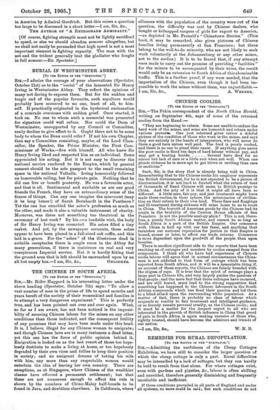SIR,—The Pekin correspondent of the North China Herald, writing on
September 4th, says of some of the returned coolies from the Rand
"They are beginning to return. Some are unable to endure the hard work of the mines, and some are homesick and return under various pretexts. One just returned gives rather a doleful picture of the condition of those who work in the mines, and says they are entirely in the hands of interpreters, who will never do them a good turn unless well paid. The food is poorly cooked, and there is no one to plead their cause. If anything goes amiss the poor coolie is fined ten days of hard labour without pay, and may get a beating beside Several have died for no reason but lack of care or a little rest when not well. When one pleads sickness he is more apt to get blows or reviling than care or medicine."
Such, Sir, is the story that is already being told in China. Remembering that to the Chinese coolie his employer represents the British Government, for he is not expected to be a person of discrimination, it is not hard to foretell what the return of tens of thousands of Rand Chinese will mean to British prestige in China. And the pity of it is that it might all have been so different. A little care, fair pay, and just treatment might have made these coolies, in their sphere, the missionaries of civilisa- tion on their return to their own land. These fines and floggings and ill-treatment during sickness will come home to us to roost in China. The boycott of American goods by the Chinese had its origin in the brutality of the Custom House officials of San Francisco. Is not the possible analogy plain? This is not, there. fore, a purely South African matter, and cannot be so long as South Africa is a part of the British Empire. Our commerce with China is knit up with our fair fame, and anything that tarnishes our national reputation for justice in that Empire is bound, sooner or later, to affect our trade returns. Commerce is more dependent upon the goodwill of the people than upon treaties.
There is another significant side to the reports that have been reaching us of outrages and murders by coolies escaped from the compounds. I think all who have had experience of Chinese coolie labour will agree that in normal circumstances the China- man is not addicted to that form of outrage which has been reported from South Africa, and it will be a lamentable thing if, on account of these reports, the Chinese are falsely branded with the stigma of rape. It is true that the spirit of revenge plays a large part in Chinese life, and very largely guides the passions of that people ; and the mere fact that these outrages have occurred, and are still feared, must lead to the strong supposition that something has happened to the Chinese labourers in the South African compounds which has fired their passion and led them to a blind attack upon the surrounding white population. As a matter of fact, there is probably no class of labour which responds so readily to fair treatment and intelligent guidance, or so fiercely resents personal cruelty, as the Chinese coolie; and it must be a matter for the deepest regret to all who are interested in the growth of British influence in China that greed of gain in South Africa is again making enemies of those who, rightly treated, should have become the admirers and friends of our nation.
—I am, Sir, dre., W. N. B.


















































 Previous page
Previous page